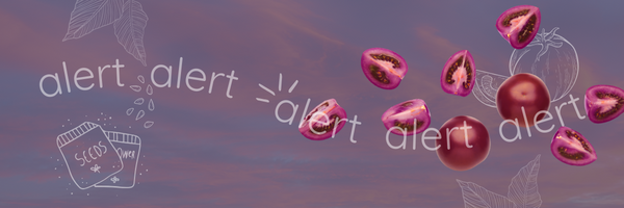
In case you haven’t heard, a new tomato introduced into the marketplace has been causing quite a stir. The GM purple tomato has made its US debut with the saturation of a cluster bomb.
The tomato was developed by Norfolk Plant Sciences (NPS), a biotech company located in Norwich, UK. NPS was founded in 2008 – the same year that the purple tomato was revealed to the world – by Cathie Martin and Jonathan Jones of the John Innes Centre and Sainsbury Laboratory.
Officially known as Del/Ros1, the purple tomato was created by modifying a cherry tomato, the variety MicroTom, through the insertion of Delila (Del) and Rosea1 (Ros1) genes from a snapdragon (Antirrhinum majus). The goal was to increase the tomato’s levels of flavonoid antioxidants, specifically anthocyanins, which are considered to be beneficial for cardiovascular health as well as useful in helping to prevent cancer, diabetes and obesity. The modification resulted in a tomato that has deep purple flesh as well as a purple skin. Blueberries, blackberries, cherries and purple grapes are some of the fruits that naturally have high levels of anthocyanins.
Early in the tomato’s history – and facing opposition to GMOs in the EU – in 2014, Martin took her purple tomatoes to Ontario, Canada, forming a partnership with New Energy Farms, a 300-acre farm that mostly produced livestock feed. The tomatoes were grown in the farm’s 5,000-square-foot greenhouse and then crushed and processed for return to the UK.
The next step was to get them approved for cultivation in the US. Norfolk Plant Sciences submitted a Regulatory Status Review (RSR) petition to USDA in 2021; and in September 2022, USDA/APHIS notified the developer that because the purple tomato did not meet the requirements of the department’s narrow regulatory authority (i.e., did not pose a plant pest risk), it would not be regulated. The developer’s voluntary FDA review was concluded in June 2023, paving the way for a US launch.
The tomato is being marketed in the US by Norfolk Healthy Produce (NHP), an affiliate of NPS, which is located in Davis, California. NHP was founded in 2021 with significant venture capital funding. A major investor in NHP is BioGenerator Ventures, a venture capital firm located in St. Louis, Missouri.
The purple tomato has made its US commercial debut on several fronts, including food service and retail. NHP has growing partners in Missouri, North Carolina and Virginia but has yet to identify a growing partner in California, where the company is headquartered. According to NHP’s website, the tomato is being served to consumers in a number of restaurants in several states, including Massachusetts, North Carolina and California; and the fruit is available via several farmer’s markets in North Carolina and Kansas.
In addition, NHP is reportedly working with a St. Louis, Missouri, producer – Two Men and a Garden – to launch a purple tomato salsa. Future plans call for the launch of additional purple tomato products (e.g., sauces, juices) as well as the development and commercialization of new GM tomatoes and other GM fruits and vegetables.
All that being said, perhaps the most surprising element of the purple tomato’s expansive US debut came with NHP’s announcement in February that GM purple tomato seeds would be available for purchase on the company’s website, marking the first time that a genetically modified food crop would be made available to home gardeners in the US.
GM purple tomato seed packets were sold at a cost of $20 for 10 seeds. NHP reportedly sold over 10,000 packets during the first month. By way of comparison, it is interesting to note that Black Beauty heirloom (i.e., non-GMO) purple tomato seeds sell for about $5 for a pack of 25 seeds.
Many were unaware that GM seeds were being made commercially available in the US. In fact, one seed company, Baker Creek Heirloom Seeds (Baker Creek), which sells seeds for heirloom purple tomato varieties such as Black Beauty, Indigo Blue Chocolate and Blue Beauty, featured a purple tomato named Purple Galaxy on the cover of its spring seed catalog, unaware of the tomato’s potential association with genetic modification. The tomato featured a purple skin and purple flesh. Shortly after the catalog’s debut, Baker Creek was alerted to the fruit’s potential association with the GM purple tomato, at which point the company discontinued the product and issued a statement.
Alas, this is likely only the beginning of the GM purple tomato conversation. Cathie Martin is working on another GM hybrid purple tomato named Indigo.
Non-GMO Project’s Standard defines all crops and products developed using biotechnology, including new gene-editing techniques, as GMOs. We share this information to further one of the Project’s primary goals of creating greater transparency in the supply chain, ensuring you have the information you need to make the best choices for you, your brand, and your family.
Please note that the information herein is for general informational purposes only and is based on the linked sources above.
The Non-GMO Project is a 510c3 nonprofit dedicated to protecting and promoting non-GMO alternatives. New GMO Alerts is supported by funding from readers like you. Donate today
